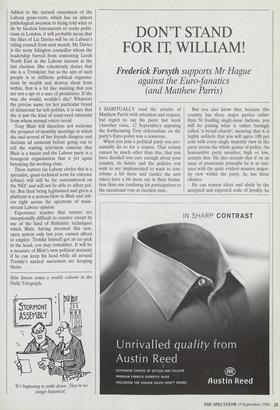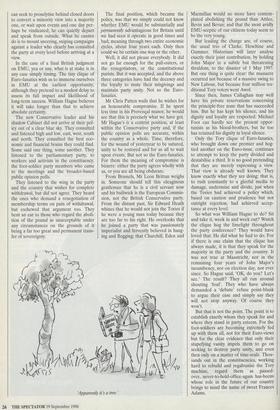DON'T STAND FOR IT, WILLIAM!
Frederick Forsyth supports Mr Hague
against the Euro-fanatics (and Matthew Parris)
I HABITUALLY read the articles of Matthew Parris with attention and respect, but regret to say his piece last week (Another voice, 12 September) opposing the forthcoming Tory referendum on the party's Euro-policy was a nonsense.
When you join a political party you pre- sumably do so for a reason. That reason cannot be much other than this: that you have decided you care enough about your country, its future and the policies you wish to see implemented to want to con- tribute a bit more and (under the new rules) have a bit more say in their forma- tion than one confining his participation to the occasional vote at election time. But you also know that, because this country has three major parties rather than 50 feuding single-issue factions, you will be joining what is rather boringly called 'a broad church'; meaning that it is highly unlikely that you will agree 100 per cent with every single majority view in the party across the whole gamut of policy. An honourable party member, high or low, accepts that. He also accepts that if on an issue of passionate principle he is at vari- ance with the quite evident massive major- ity view within the party, he has three choices.
He can remain silent and abide by the accepted and expected code of loyalty; he can seek to proselytise behind closed doors to convert a minority view into a majority one, or wait upon events and one day per- haps be vindicated; he can quietly depart and speak from outside. What he cannot do is to mount sneering, sniping campaigns against a leader who clearly has consulted the party at every level before arriving at a view.
In the case of a final British judgment on EMU, yea or nay, what is at stake is in any case simply timing. The tiny clique of Euro-fanatics wish us to immerse ourselves in EMU at the earliest opportunity, although they pretend to a modest delay to assess its full impact and likelihood of long-term success. William Hague believes it will take longer than that to achieve absolute certainty.
The new Conservative leader and his shadow Cabinet did not arrive at their pol- icy out of a clear blue sky. They consulted and listened high and low, east, west, south and north. They consulted the best eco- nomic and financial brains they could find. Some said one thing, some another. They listened to the parliamentary party, to workers and activists in the constituency, the foot-soldier party members who came to the meetings and the broader-based public opinion polls.
They listened to the wing in the party and the country that wishes for complete withdrawal, but did not agree. They heard the ones who demand a renegotiation of membership terms on pain of withdrawal, but eschewed that argument too. They bent an ear to those who regard the aboli- tion of the pound as unacceptable under any circumstances on the grounds of it being a far too great and permanent trans- fer of sovereignty. The final position, which became the policy, was that we simply could not know whether EMU would be substantially and permanently advantageous for Britain until we had seen it operate in good times and bad; meaning through two entire economic cycles, about four years each. Only then could we be certain one way or the other.
Well, it did not please everybody. It did not go far enough for the pull-outers, or the renegotiators, or the constitutional purists. But it was accepted, and the above three categories have had the decency and the loyalty to mute their misgivings and maintain party unity. Not so the Euro- fanatics.
Mr Chris Patten wails that he wishes for an honourable compromise. If he spent less time in his Provençal manor, he would see that this is precisely what we have got. Mr Hague's is a centrist position, at least within the Conservative party and, if the public opinion polls are accurate, within the country as a whole. Time, therefore, for the wound of yesteryear to be sutured, unity to be restored and for us all to wait upon events. But not so the Euro-fanatics. For them the meaning of compromise is bizarre: either the party agrees wholly with us, or you are all being obdurate.
From Brussels, Mr Leon Brittan weighs in. Someone should tell this oleaginous gentleman that he is a civil servant now and his bailiwick is the European Commis- sion, not the British Conservative party. From the distant past, Sir Edward Heath whines that he would not join the Tories if he were a young man today because they are too far to his right. He overlooks that he joined a party that was passionately imperialist and fervently believed in hang- ing and flogging; that Churchill, Eden and Apparently it's a tree.' Macmillan would no more have contem- plated abolishing the pound than Attlee, Bevin and Bevan; and that the most avidly EMU-sceptic of our citizens today seem to be the very young.
But leading the charge are, of course, the usual trio of Clarke, Heseltine and Gummer. Historians will later analyse exactly their joint contribution, by holding John Major in a subtle but threatening thraldom, to the disaster of 1 May 1997. But one thing is quite clear: the massacre occurred not because of a massive swing to New Labour, but because four million tra- ditional Tory voters went Awol.
Since then, James Callaghan may well have his private reservations concerning the principle-free zone that has succeeded him. But he has kept his silence, and his dignity and loyalty are respected. Michael Foot can hardly see the present oppor- tunists as his blood-brothers, but he too has retained his dignity in loyal silence.
Only the Tory clique of Euro-fanatics, who brought down one premier and hog- tied another on the Euro-issue, continues to attempt to keep the party divided and destabilise a third. It is no good pretending that they are merely expressing a view. That view is already well known. They know exactly what they are doing; that is, to rush constantly to a gleeful media to damage, undermine and divide, just when the Tories had achieved a policy which, based on caution and prudence but not outright rejection, had achieved accep- tance at every level.
So what was William Hague to do? Sit and take it, week in and week out? Watch the clique hog the limelight throughout the party conference? They would have loved that. He did what he had to do. For if there is one claim that the clique has always made, it is that they speak for the majority in the party and the country. It was not true at Maastricht, nor in the remaining four years of John Major's incumbency, nor on election day, nor ever since. So Hague said, 'OK, do you? Let's see.' The result? They all run around shouting 'foul'. They who have always demanded a 'debate' refuse point-blank to argue their case and simply say they will not stop anyway. Of course they won't.
But that is not the point. The point is to establish exactly whom they speak for and where they stand in party esteem. For the foot-soldiers are becoming extremely fed up with them all, not for their Euro-views but for the clear evidence that only their stupefying vanity impels them to go on seeking to destroy party unity, and even then only on a matter of time-scale. Thou- sands out in the constituencies, working hard to rebuild and regalvanise the Tory machine, regard them as passed- over, never-to-hold-office-again has-beens whose role in the future of our country brings to mind the name of sweet Frances Adams.











































































 Previous page
Previous page